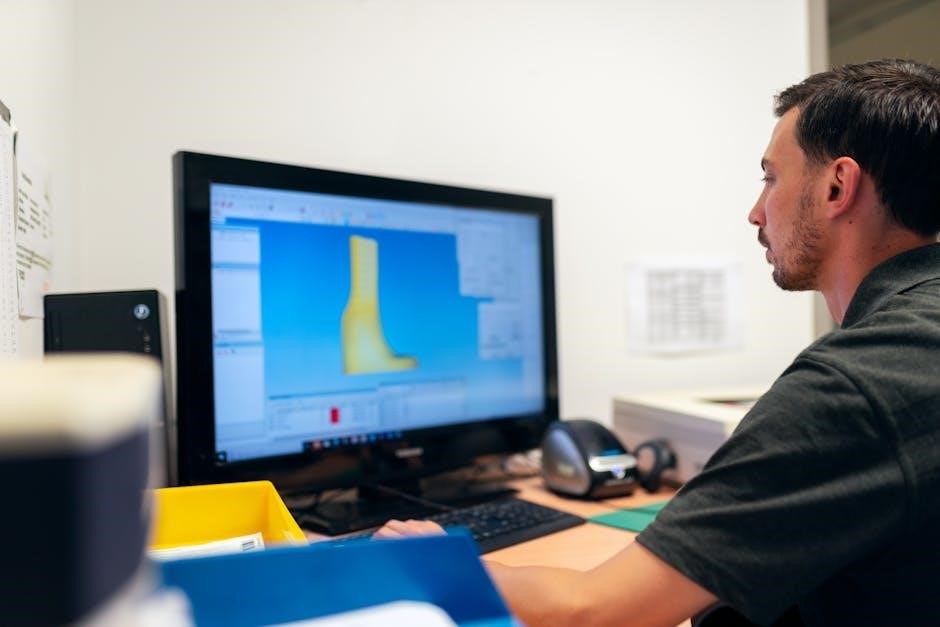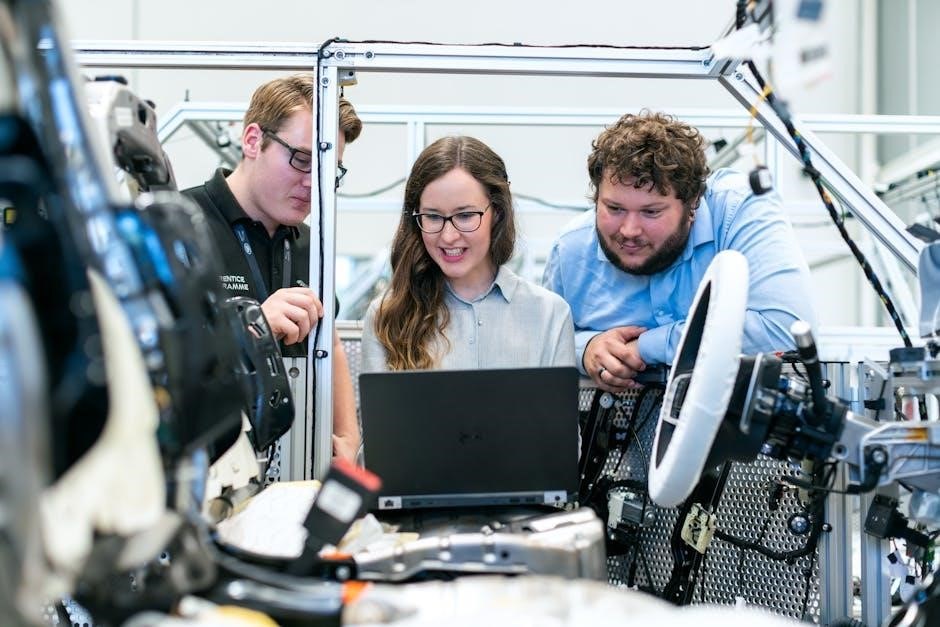Google’s software engineering culture emphasizes collaboration, innovation, and scalability. It focuses on robust solutions, continuous learning, and maintaining code health through rigorous practices and open-source contributions.
1.1 Overview of Google’s Unique Engineering Culture
Google’s engineering culture is built on collaboration, innovation, and a commitment to solving complex problems at scale. It emphasizes continuous learning and improvement, fostering an environment where engineers can grow and contribute effectively. The culture prioritizes robust, scalable, and maintainable solutions, ensuring long-term code health through rigorous testing and documentation practices. Open communication and cross-functional teamwork are cornerstone principles, enabling engineers to align on goals and deliver impactful results.
Google’s unique approach also includes a strong focus on generalized engineering practices, applicable across all languages and projects. These practices, developed over time, ensure consistency and efficiency in software development. By adhering to these principles, Google’s engineers maintain high standards of quality and reliability, driving the company’s success in delivering cutting-edge technologies.

1.2 The Role of Software Engineers at Google

Software engineers at Google play a pivotal role in developing and maintaining the company’s vast array of products and services. They are responsible for designing, writing, testing, and deploying high-quality code that meets stringent standards. Engineers collaborate across teams to solve complex technical challenges, ensuring scalability, reliability, and efficiency in Google’s systems. Their work spans from improving existing products to pioneering new technologies, driving innovation in areas like artificial intelligence, cloud computing, and mobile development. Additionally, software engineers at Google are expected to contribute to open-source projects, share knowledge, and mentor junior team members, fostering a culture of continuous learning and growth within the organization.
1.3 Key Principles of Google’s Software Engineering
Google’s software engineering is guided by several key principles that ensure scalability, reliability, and maintainability. These principles include writing clean, modular code that adheres to strict style guides and best practices. Engineers emphasize testability, with comprehensive testing strategies to ensure code robustness. Collaboration is another cornerstone, with code reviews being a critical part of the development process. Google also prioritizes scalability, designing systems that can handle exponential growth. Additionally, the company fosters a culture of continuous learning and improvement, encouraging engineers to adopt new technologies and share knowledge. Open-source contributions are highly valued, reflecting Google’s commitment to collaboration with the broader developer community. These principles collectively drive Google’s ability to deliver innovative and high-quality software solutions.

Best Practices and Processes in Google’s Software Engineering
Google’s engineering success relies on robust processes and tools, including code reviews, comprehensive testing, debugging, and adherence to design and documentation standards, while fostering open-source contributions.
2.1 Code Review Processes and Policies at Google
Google’s code review process is a cornerstone of its engineering practices, ensuring code health and scalability. The primary goal is to improve the overall quality and maintainability of the codebase. Code reviews at Google are detailed, with a focus on style guidelines, testability, and adherence to best practices. Reviewers check for clarity, efficiency, and whether the code aligns with long-term project goals. The process involves balancing trade-offs to ensure scalability and efficiency. Google provides detailed guides, such as “How To Do A Code Review,” to help reviewers and authors understand expectations. This collaborative approach fosters a culture of continuous learning and shared ownership of code quality. By prioritizing thorough reviews, Google maintains its reputation for robust and reliable software solutions.

2.2 Generalized Engineering Practices Across Languages and Projects

Google’s engineering practices are designed to be applicable across all programming languages and projects, ensuring consistency and scalability. These practices, documented in the Google Engineering Practices guide, represent the company’s collective experience and best practices. They cover essential skills like testing, debugging, design, and documentation, emphasizing maintainability and efficiency; The practices are language-agnostic, allowing engineers to apply them universally, whether working with Python, Java, or other languages. This approach fosters a culture of collaboration and shared knowledge, enabling teams to work cohesively toward common goals. By standardizing these practices, Google ensures high-quality, reliable, and scalable software solutions across its diverse portfolio of projects, reinforcing its reputation as a leader in software engineering excellence.
2.3 Testing and Debugging Strategies
Google prioritizes testing and debugging as critical components of its software engineering process. Automated testing frameworks, such as Google Test and pytest, are widely used to ensure code reliability. Testing is viewed as a shared responsibility, with developers, testers, and reviewers collaborating to identify and resolve issues early. Google emphasizes writing maintainable and scalable tests, balancing speed and thoroughness. Debugging strategies focus on root cause analysis, leveraging tools and methodologies to quickly isolate and fix issues. The company also employs continuous integration and delivery pipelines to detect problems in real-time. By combining robust testing practices with a culture of continuous improvement, Google ensures high-quality software solutions while maintaining its rapid development pace and scalability needs.
2.4 Design and Documentation Practices
Google’s software engineering emphasizes clear and maintainable design through comprehensive documentation practices. Design documents, or “design docs,” are central to planning and collaboration, outlining project goals, architecture, and implementation details. These documents are regularly reviewed and updated to ensure alignment with evolving requirements. Code is accompanied by detailed comments and API documentation, adhering to Google’s internal style guides. The company also maintains centralized repositories for design and technical documentation, ensuring accessibility and consistency. Google encourages developers to follow standardized templates and guidelines to promote clarity and readability. By integrating design and documentation into the development workflow, Google ensures that its software remains scalable, understandable, and maintainable over time; This approach fosters collaboration and reduces friction across teams, supporting the company’s rapid innovation cycle.
Google actively promotes open source contributions as a key part of its software engineering culture. By sharing code and collaborating with the global developer community, Google fosters innovation and accelerates technological advancements. Open source projects like Android, Chromium, and TensorFlow have become foundational to industries worldwide. Contributions to open source not only enhance Google’s reputation but also attract top talent who value transparency and collaboration. Google encourages its engineers to participate in open source projects, believing that such efforts lead to better software quality and broader adoption. This commitment to open source aligns with Google’s mission to organize the world’s information and make it universally accessible, driving a culture of shared progress and mutual benefit. By embracing open source, Google strengthens its position as a leader in the tech industry. Google offers diverse opportunities for software engineers, including internships, apprenticeships, and career growth resources, fostering a culture of continuous learning and innovation in a collaborative environment. Aspiring software engineers at Google should focus on mastering coding fundamentals, practicing with platforms like LeetCode, and understanding the company’s unique engineering culture. Emphasize continuous learning, collaboration, and problem-solving skills. Familiarize yourself with Google’s coding standards and practices, such as rigorous testing and debugging. Build a strong foundation in software design and documentation. Engage with open-source projects to demonstrate contributions and collaboration. Highlight soft skills like communication and teamwork, as Google values cross-functional collaboration. Stay updated on industry trends and Google’s technological advancements. Prepare for interviews by understanding common questions and practicing whiteboarding exercises. Networking and mentorship can also provide valuable insights into Google’s engineering environment. Google’s Software Engineering Apprenticeship Program offers hands-on experience, mentorship, and project-based learning for aspiring engineers. The program, such as the 2025 Paris cohort, focuses on developing technical and soft skills through real-world projects. Apprentices collaborate with experienced engineers, contributing to Google’s products while gaining insights into its engineering practices. The program emphasizes code health, testing, and scalability, aligning with Google’s engineering principles. Participants also engage in codewalks and technical discussions, fostering a culture of continuous learning. This opportunity is designed to bridge academic knowledge with industry practices, preparing apprentices for successful software engineering careers. Applications are highly competitive, with a focus on problem-solving abilities and a passion for innovation. Google offers internships for software engineering students, providing hands-on experience with cutting-edge technologies. These internships, such as the 2025 winter program for PhD students, last 22-24 weeks. Interns contribute to real projects, working alongside experienced engineers and gaining insights into Google’s engineering practices. The program focuses on innovation, collaboration, and problem-solving, aligning with Google’s commitment to robust and scalable solutions. Interns also participate in code reviews, testing, and design discussions, enhancing their technical and soft skills. Google’s internships are highly competitive, with applications accepted until specific deadlines, offering a pathway to full-time opportunities. This experience helps bridge academic knowledge with industry practices, preparing students for successful careers in software engineering.2.5 The Importance of Open Source Contributions

Career Development and Opportunities in Software Engineering at Google

3.1 Tips for Aspiring Software Engineers at Google
3.2 Google’s Software Engineering Apprenticeship Program

3.4 Software Engineering Internship Opportunities


Leave a Reply
You must be logged in to post a comment.